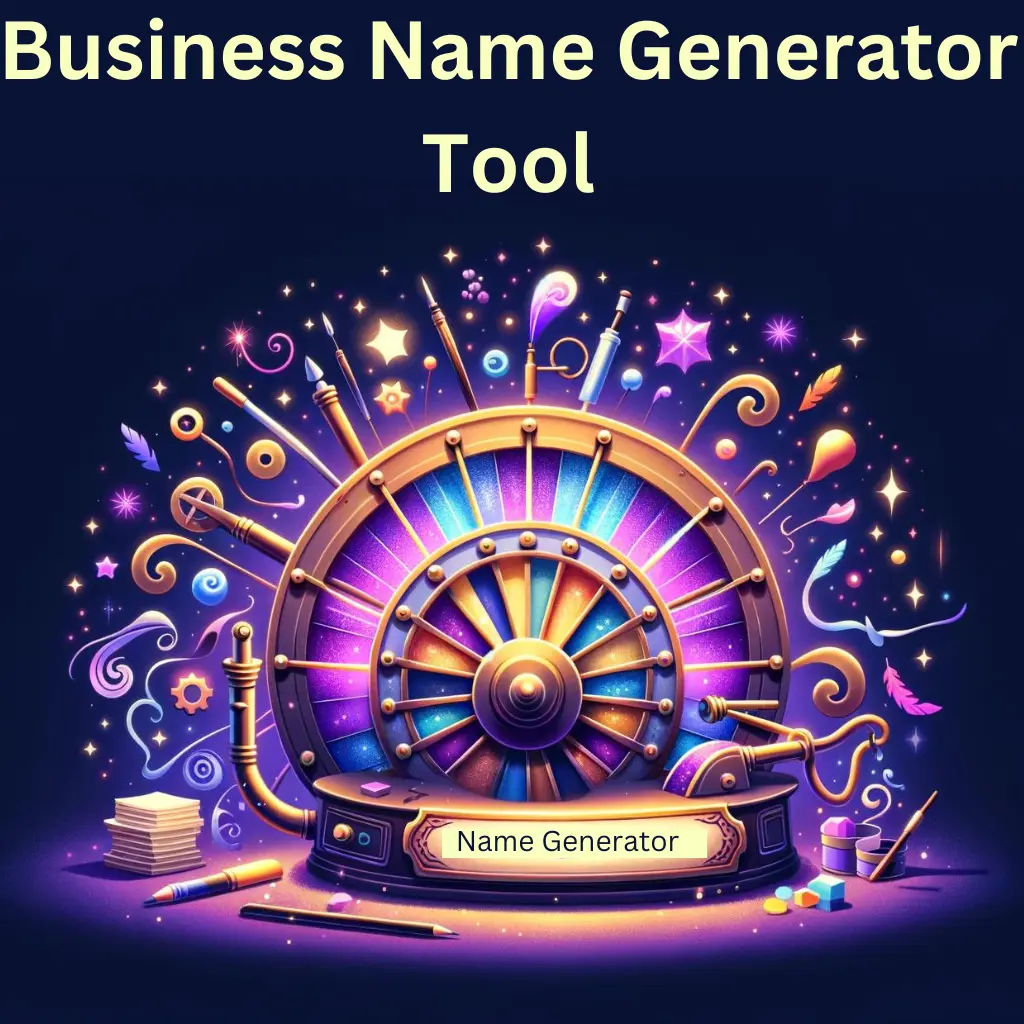- Try Our Free Business Name Generator!
- Why Use a Business Name Generator?
- Optimization Tips for Choosing a Business Name
- How Does Our Business Name Generator Enhance User Experience?
- Tools and Resources for Name Generation
- Important Disclaimer about Our Name Generator Tool
- Future-Proofing Your Business Name
- Conclusion to Our Business Name Tool
- Frequently Asked Questions (FAQs) About Choosing a Business Name
- What are the benefits of using a business names generator?
- How important is domain availability when choosing a business name?
- Can I trademark the business name I generate?
- Should my business name reflect my business industry?
- What should I do if my preferred business name is taken?
- How do I ensure my business name is not offensive in other languages?
- What is the difference between a business name and a trading name?
- How can I test the effectiveness of a business name?
- Are there any legal restrictions on business names?
- How often should I revisit and possibly revise my business name?
- Frequently Asked Questions (FAQs) About Choosing a Business Name
Try Our Free Business Name Generator!
Business Name Generator
Unleash Creativity with the Ultimate Business Name Generator
Starting a business can be a daunting endeavor, and one of the first, yet crucial, steps is choosing the right name. It’s the identity that will go on all your marketing, branding, and legal documents. It’s how customers will recognize you. That’s where a business name generator comes in handy, simplifying what can often be a challenging process.

Why Use a Business Name Generator?
Effortless Ideation: The business name generator does the heavy lifting for you. By simply inputting keywords that reflect your company’s essence or choosing a relevant category, the tool suggests a plethora of names that are not only fitting but also creative and unique. This can save hours that you would otherwise spend brainstorming ideas.
Instant Branding: A great business name gives you instant brand recognition. The business name generator provides options that are crafted to convey the tone and values of your business, aligning closely with your brand identity from the get-go.
Versatility and Variety: Whether you’re starting a tech company, a fashion label, or a healthcare venture, the business name generator covers a wide range of industries. This tool ensures that no matter your sector, you’ll get tailored suggestions that resonate with your niche.
Market-Ready Choices: The names generated are designed not just for appeal but also for marketability. These names can help set the tone for your brand’s public image and marketing strategy, making them valuable assets as you build your presence in the industry.
Case Studies of Successful Business Names
The power of a memorable and marketable business name can be seen in several successful enterprises that have utilized business name generators to kickstart their branding journey. Here are a few illustrative examples:
1. Exploration Kids
A business focused on children’s educational materials, Exploration Kids used a business name generator to find a name that is both descriptive and imaginative, appealing directly to its target market—parents and educators looking for engaging learning materials for children (Shopify).
2. Darwin Travel
Specializing in adventure and eco-tourism, Darwin Travel effectively used a business name generator to convey a sense of exploration and evolution in travel experiences, aligning with the adventurous spirit of its clientele (Shopify).
3. Yoga Professor
By choosing a name that mixes authority and the wellness sector, Yoga Professor used a business name generator to position itself as an expert in the yoga community, which helped establish the brand as a go-to resource for those looking to deepen their yoga practice (Shopify).
4. Spa Paragon
This name, generated by a business name generator, reflects ultimate excellence and luxury in spa services, instantly elevating the brand’s appeal and effectively targeting a high-end customer base looking for superior spa experiences (Shopify).
These examples showcase how effectively chosen names from a business names generator can encapsulate a company’s essence and appeal directly to its intended market. They highlight the necessity of a name that resonates well with the target audience and fits the brand’s identity and values, thereby enhancing both marketability and memorability.
Choosing the right business name is a critical step that can significantly influence your brand’s success and online presence. Utilizing a business name generator can provide a wealth of creative options that might not have been considered otherwise, proving to be a vital tool in the branding process.
Optimization Tips for Choosing a Business Name
Selecting the right business name is a crucial step that can significantly influence your brand’s success and online presence. Here are some key strategies to optimize your business name for maximum impact:
1. Keep It Simple and Memorable
Aim for a name that is easy to spell, pronounce, and remember. Short names are usually more powerful, especially in today’s digital age, where attention spans are short.
Avoid using obscure words, overly complex spelling, or jargon that might be unfamiliar to your audience. A simple and straightforward name can be a potent tool in ensuring that your brand stays top-of-mind with consumers.
2. Consider SEO from the Start
To make your business easy to find online, include relevant keywords in your business name that reflect your industry or the services you offer.
For example, if you’re starting a coffee shop, incorporating words like “brew,” “cafe,” or “espresso” can help improve your SEO rankings. Utilize tools like Google Keyword Planner to find keywords with good search volumes and low competition that can give you an edge.
3. Check Domain Availability
Before you settle on a name, check if the corresponding web domain is available. Ideally, you want a “.com” domain, as it’s the most recognized and trusted domain suffix.
Use domain registration sites to check the availability of your preferred business name as a URL. If your first choice isn’t available, consider using slight variations of the name or adding industry-specific keywords to find an available domain that still represents your brand well.
4. Make It Scalable
Choose a name that doesn’t limit your business to a particular product or city unless you are sure you want to remain niche.
For instance, adding “New York” to your business name might not be ideal if you plan to expand to other cities or countries in the future. Similarly, a name like “Bookstore 360” might limit your ability to expand into other product lines beyond books.
5. Test It with Your Target Audience
Once you have a few names in mind, test them out with your target audience to see which ones resonate the most. You can conduct surveys or A/B tests across various demographics to gather feedback.
Pay attention to how easy it is for people to spell, pronounce, and recall the names. This feedback can be invaluable in understanding the emotional and psychological impact of your brand name on your audience.
6. Ensure Cross-Cultural Competence
If you plan to market your business globally, make sure that your business name does not have negative connotations in other languages or cultures. A quick international search can help prevent potential embarrassments or unintended meanings that could alienate potential customers.
By following these optimization tips, you can enhance the effectiveness of your business name, making it a powerful part of your brand’s identity and marketing strategy. Choosing the right name with these considerations in mind can set the foundation for your business’s future growth and success.

How Does Our Business Name Generator Enhance User Experience?
The business names generator is incredibly user-friendly. With a clean interface and straightforward functionality, it allows users to navigate easily without any confusion. The process is quick, resulting in immediate suggestions that make efficient use of your time.
Moreover, the tool is equipped with filters and customization options that let you refine your search based on industry specifics, ensuring that the names are not only catchy but relevant. Whether you enter specific keywords or select a broad category, you’re met with a list of options that can be the very foundation of a successful branding strategy.
Tools and Resources for Name Generation
When selecting a business name, a simple generator might get you started, but additional tools and resources can refine your choice and ensure it’s suitable and legally available. Here are some essential tools and resources that can aid in the naming process:
1. Trademark Databases
- United States Patent and Trademark Office (USPTO): Before settling on a name, check it against registered trademarks to avoid legal issues. The USPTO’s trademark database can be accessed here.
- European Union Intellectual Property Office (EUIPO): If you are considering business in the EU, verify your business name against the EUIPO’s database, available here.
2. Domain Name Checkers
- GoDaddy: As one of the largest domain registrars, GoDaddy offers a powerful tool to check domain name availability.
- Namecheap: Known for competitive pricing, Namecheap also provides a comprehensive domain search tool to ensure your business name has an available web address.
3. Social Media Availability Tools
- Namechk: To build a cohesive online presence, ensure your business name is available across various social platforms. Use Namechk to check the availability of your business name on multiple platforms simultaneously at Namechk.
4. Business Name Generators with Additional Features
- Shopify Business Name Generator: Offers a seamless interface that not only helps generate business names but also checks domain availability. Try it here.
- Namelix: Generates short, brandable business names using artificial intelligence and provides logo creation simultaneously. Check it out here.
5. Logo Creation and Visual Identity Tools
- Looka: After choosing a name, creating a visual identity is the next step. Looka combines logo creation with business naming, allowing you to see potential business logos as you choose your name. Visit Looka here.
- Canva: Known for its user-friendly design tools, Canva allows businesses to design logos and other branding materials easily. Start designing with Canva here.
6. Legal Consultation Services
- LegalZoom: Offers trademark registration and legal advice to ensure your business name complies with all regulations. Explore their services here.
- Rocket Lawyer: Provides online legal advice and services, including help with trademarks and business formations. Their services can be accessed here.
Using these tools in combination can significantly streamline the process of naming your business, ensuring the name not only resonates with your target audience but is also legally and digitally optimized. These resources provide a comprehensive approach from creative brainstorming to securing legal protections for your brand.
Important Disclaimer about Our Name Generator Tool
Before finalizing and using any name generated by the business names generator, it is crucial for users to verify the availability of the name. This includes checking with relevant business registries, trademark offices, and conducting an internet search to ensure that the name is not already in use by another entity.
Availability checks are essential to avoid legal conflicts and to ensure that your chosen name can be legally registered and trademarked, safeguarding your brand identity in the marketplace.
Please note that the business names generator provides suggestions that can inspire your choice of a business name. However, it is your responsibility to ensure that the name you select is not only available but also compliant with all legal requirements pertaining to business name registration and trademark laws in your jurisdiction.
Legal Considerations When Naming Your Business
Choosing a business name is not only a critical branding decision but also a significant legal consideration.
Ensuring that your business name complies with local and international laws and regulations can save you from costly legal disputes and help protect your brand’s integrity. Here are key legal aspects to consider when selecting a business name:
1. Conduct Comprehensive Trademark Searches
Before you decide on a business name, it’s essential to perform a thorough trademark search to ensure that the name is not already in use or registered under another party.
A trademark provides legal protection for your brand name and helps guard against others using a similar identity that could potentially confuse consumers. Use online resources such as the United States Patent and Trademark Office (USPTO) or the European Union Intellectual Property Office (EUIPO) databases to search for existing trademarks that could conflict with your chosen name.
2. Understand the Difference Between Business Registration and Trademarking
Registering your business name with local or state authorities is an important step, but it is not the same as trademarking.
Business registration typically allows you to legally operate under a particular name within your state or locality but does not prevent someone from using the same or a similar name in another jurisdiction or industry.
Trademarking your business name, on the other hand, provides broader protection by preventing others from using your brand name for similar or related products or services at a national or international level.
3. Ensure Compliance with Local and International Laws
When choosing a business name, ensure that it complies with all relevant local laws. This includes avoiding names that imply a connection with public institutions or use terms that require specific licenses (such as “bank” or “insurance”).
For businesses planning to operate internationally, consider the implications of the name in other cultures and languages to avoid using words that may be offensive or have negative connotations.
4. Avoid Misleading or Deceptive Names
The law in many jurisdictions prohibits the use of names that could mislead the public.
For example, using the name “Organic” for a business that sells processed foods with artificial ingredients might be considered deceptive. Similarly, a business name should not misrepresent the business’s scope, scale, or affiliation with government entities.
5. Check for URL Availability
In today’s digital age, it is also wise to consider whether your business name can be used as a web domain. Having a URL that matches your business name adds credibility and makes it easier for customers to find you online.
Ensure the domain is available to avoid potential legal issues with cybersquatters who might register your chosen name as a domain to sell it back to you at a higher price.
6. Seek Professional Legal Advice
Given the complexities involved in trademark laws and registration procedures, it is advisable to consult with a legal expert specializing in intellectual property. They can provide personalized advice tailored to your business needs and help navigate the registration and trademarking process to ensure full legal protection for your brand name.
By considering these legal aspects when naming your business, you can avoid potential legal pitfalls and establish a strong, protected brand identity right from the start. This foundational work is crucial for building a reputable and legally secure business presence in any market.
Future-Proofing Your Business Name
Selecting a business name that not only resonates with your brand today but also grows along with it is an essential strategy for long-term success.
A name that is scalable and adaptable can significantly enhance the flexibility of your branding and allow you to explore new opportunities without the constraints imposed by a too specific or niche name. Here are some insights on how to choose a name that can evolve as your company grows:
1. Avoid Overly Specific Names
Choosing a name that is too specific can limit your business’s growth. For example, a city name like “Nashville Eats” might limit the business to a specific geographic area, which could be a drawback if you plan to expand regionally or nationally. Similarly, a product-specific name like “QuickPrint 3D” could be limiting if you decide to broaden your product lines beyond 3D printing in the future.
2. Opt for Abstract or Invented Names
Abstract names like “Accenture” or invented names such as “Verizon” provide a high degree of flexibility. These names don’t tie the business to any specific product, service, or industry, which makes it easier to pivot or expand into new markets. These names can serve as a blank slate to which any brand attributes can be attached.
3. Use Broad Industry Terms
If abstract names don’t fit your brand, consider using broader industry terms that are not too narrow. For example, “TechAdvantage” is preferable to “LaptopFix” if you might expand your tech support business beyond laptop repairs. This strategy includes avoiding terms that might become outdated due to technological or market changes.
4. Consider Your Long-Term Vision
When brainstorming business names, reflect on your long-term business goals. Where do you see your business in the next 10 or 20 years? What kind of products or markets might you explore? Your business name should be a good fit not only for your current operations but also for future expansions or pivots.
5. Ensure Cultural Relevance
As your business grows, especially if it expands internationally, your name should resonate well across different cultures and languages. It’s crucial to check that it doesn’t have inappropriate or negative connotations in other languages. This check can help avoid branding blunders that could be costly and complex to fix later.
6. Test Name Elasticity
Before finalizing your business name, consider its elasticity—how well it can stretch to cover future expansions or changes in direction. You might use focus groups or surveys to test if the name could plausibly cover different markets or services. This feedback can be invaluable in assessing the potential longevity and adaptability of your brand name.
By considering these factors, you can choose a business name that not only suits your brand today but also has the potential to grow with it, adapting to new opportunities and markets, thus future-proofing your brand identity.
Conclusion to Our Business Name Tool
For entrepreneurs eager to carve out their niche in the business world, this business names generator is more than just a tool—it’s a launchpad for your branding journey. It provides a creative, efficient, and user-focused solution to one of the earliest challenges of business creation: naming your enterprise.
Embrace simplicity and creativity; let the business names generator set the stage for your business success.
Frequently Asked Questions (FAQs) About Choosing a Business Name
What are the benefits of using a business names generator?
A: A business names generator simplifies the creative process by providing diverse and unique name suggestions that are not only relevant to your business sector but also available for domain registration. This tool saves time, inspires creativity, and ensures that the name resonates with your business goals and customer expectations.
How important is domain availability when choosing a business name?
A: Domain availability is crucial as it helps establish a strong online presence. A matching domain name enhances your brand’s visibility and makes it easier for customers to find and remember your business. Tools like GoDaddy or Namecheap can help you check and secure a suitable domain.
Can I trademark the business name I generate?
A: Yes, you can trademark a business name generated from a tool to protect your brand identity legally. However, it’s essential to perform a thorough search via the USPTO or EUIPO to ensure the name isn’t already in use or registered. Legal consultation services like LegalZoom or Rocket Lawyer can provide guidance through this process.
Should my business name reflect my business industry?
A: While not mandatory, including industry-specific keywords can improve SEO, enhance brand clarity, and make the business more discoverable to potential clients. However, consider future scalability and whether the name could limit business expansion into new areas.
What should I do if my preferred business name is taken?
A: If your preferred name is taken, consider variations by adding relevant descriptors or geographic locations. Alternatively, use abstract or invented names that are unique and memorable. Always recheck availability for these alternatives.
How do I ensure my business name is not offensive in other languages?
A: Use online translation tools to check the meanings of your business name in other languages, especially if you plan to market your business globally. Consulting with native speakers and conducting market research in those regions can also prevent cultural missteps.
What is the difference between a business name and a trading name?
A: A business name is your business’s legal name under which it is registered. A trading name or a DBA (“doing business as”) name is used for public dealings and marketing. In many cases, they can be the same, but businesses can operate under multiple trading names that differ from their legal business name.
How can I test the effectiveness of a business name?
A: Test the name with potential customers to gauge recall, relevance, and impact. Use surveys, focus groups, or A/B testing on social media to see how your audience reacts to different names. This feedback can be invaluable for understanding the potential success of a name.
Are there any legal restrictions on business names?
A: Yes, legal restrictions can include the use of words that imply governmental affiliation (e.g., Federal, National), or terms needing special licenses (e.g., Bank, University). Check with local business registration authorities to ensure compliance.
How often should I revisit and possibly revise my business name?
A: Revising a business name is not common due to the potential loss of brand equity and customer confusion. However, if your business undergoes significant changes in direction, audience, or product offerings, reevaluating the name might be beneficial. Always weigh the costs of rebranding against the benefits of a new name alignment with business evolution.
- Free Toolkit, Calculators, Checklists & Quizzes
- Financial Tools to Transform Your Fiscal Future: Financial Toolkit
- Health Toolkit: Your Gateway to Health and Vitality
- Cultivating Connections: Your Relationship Toolkit
- Fun Zone: Discover Our Free Games, Quizzes and Tools
- Couple Name Generator: Discover Your Unique Love Identity
- Baby Name Generator
- Random Number Generator
- Random Name Generator












